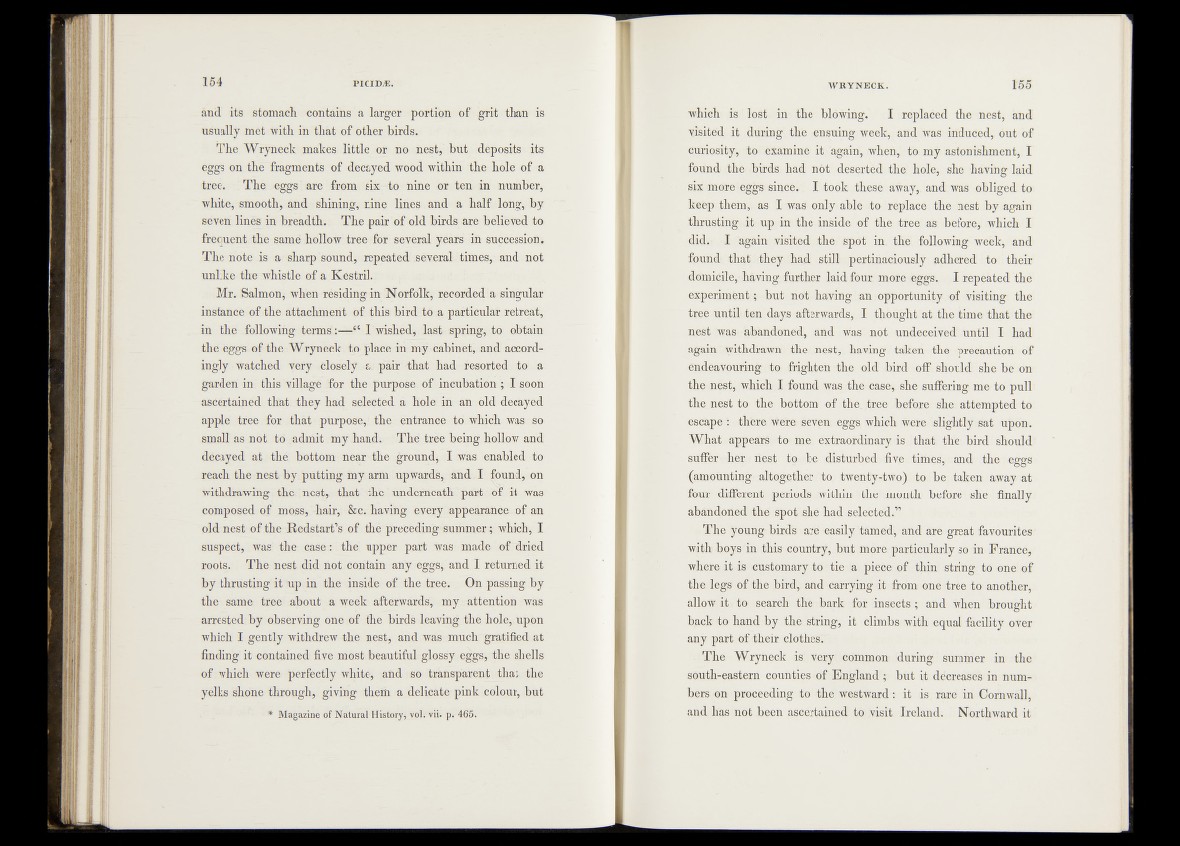
and its stomach contains a larger portion of grit than is
usually met with in that of other birds. -
The Wryneck makes little or no nest, but deposits its
eggs on the fragments of decayed wood within the hole of a
tree. . The eggs' are from six to nine or ten in number,
white, smooth, and shining, nine lines and a half long, by
seven lines in breadth.; The pair of old birds are believed to
frequent the samë hollow tree for several years' in succession,
The note is a sharp sound, repeated several times, and not
unlike the whistle of a Kestril.
Mr. Salmon, when résiding/in Norfolk, recorded a singular
instance of the attachment of this bird to a particular retreat,
in the following terms!:— “ I wished, last spring,; to obtain
the eggs of the Wryneck to place in my-cabinet, and accordingly
watched very Closely a pair -that had resorted a
garden ini this village for the purpose of incubation ; I sooii
ascertained that they had selected a hole in an old decayed
apple tree for that purpose, th e . entrance to which was so
small as not to admit my hand. The tree being hollow and
decayed at the bottom near the ground, I was enabled to
reach the nest: by putting my arm upwards;, and I found, on
withdrawing the. nest, that the underneath part • of it was
composed of moss, -hair, &c. having every appearance, of an
old nest of the Redstart’s of thé preceding-summer; which, I
suspect, was the case: thei upper part was made of dried
roots. The nest did not contain any egggj and I returned, it
by thrusting' it nip in the inside of the tree. On passing by
the same tree- about a week afterwards, my - attention was
arrested by observing one of the birds leaving the hole,/upon
which I gently withdrew the nest, and was much gratified at
finding it contained five most beautiful glossy eggs, the shells
of which were perfectly white, and so transparent . that the
yélks shone through, giving them a delicate- pink colour, but
* Magazine of Natural Hi s t o r y p . * - 4©8 . : i
which is lost in the blowing. I replaced the nest, and
visited it during the ensuing week, and was induced, out of
curiosity, to examine it again’, when, to my astonishment, I
found the. birds had not: deserted, the hole, she having laid
six'more eggs since,. I took,these, -away,, and was obliged to
keep them, as I was only able *to replace the nest by again
thrusting it* np in the-inside of the tree as before, .which I
didiy I again visited- the* spot in. the’, following week, and
fpund that"-they had still pertinaciously adhered to their
domicile,'having further laickfour more eggs. I repeated the
experimènt^but- -hot hawing an . opportunity of visiting the
tóeèJuntiLten days, .afterwards,-. I thought at.t4©> time that the
nest *wa-s-hbandoned, and was not undeceived: .until I had
again withdrawn the inpsty having taken the precaution of
endeavouring -to frighten the old' bird^ojfiisffeuld she b è b ir
the nést, which I-’found was pthe case,- she- suffering me to puli ',
thejiest to f hfebbottom of the. ^refe feefee-i she. attempted to
escape : th^lrtwere- seven- eggs, .which*j^-ete*[slightly sat upon.
What appears to me, éxtraórdinarp^i thatidh%tfeird should:
suffer -her./ rfest to 'be dtstUrbed**fi|i§ tirhes,, and the eggs
(am ounting^altogether to; .twentydwo) to,, beprtaken away a t .
four different periods^ithin thebmonth befaaréf^he finally.
abandpU^dr-thebspotfeshe had^splected.”
The young-birds -arb-easily 'tamed^ and are great favourites'
wifehtboys in thisjchuntry,.but more.particularly &$■ in France,'
where it is customary tobtie a pièJ^sof^thïn: string to one of
the «legs of and -carrying it from one «tree to another,
alloVf; it/fof search the bark for insects*?.- and when brought
b.ack to hand by,', thé: string, it climbs with equal facility over
any part of their c lo th ^ te
- The Wryneck.is!, yery; common/during summer in the
sêath-eastem counties *of England||| but it deereas#in numbers
on proceeding to the; westward: it-as ; rare in Cornwall,
a ||d has not ^keen ascertained tb.;hasit Ireland. Northward it